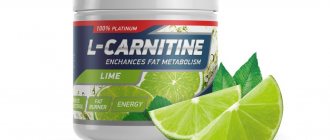What is L-carnitine
Carnitine was isolated by scientists from animal muscles at the beginning of the 20th century (carnis - in Latin flesh, meat). Today it has been established that it is a fortified amino acid that accelerates metabolic processes. Carnitine biosynthesis occurs inside the body, so it cannot be called a vitamin. But the synthesis of L-carnitine requires many components that we can only get from food:
- essential acids lysine and methionine;
- ascorbic acid;
- vitamins B3 B6 B9 B12;
- iron.
Every day our body produces up to 20 mg of L-carnitine, which is concentrated in muscle tissue - in the muscles, in the heart muscle, and in certain centers of the brain. Around the age of 40, the synthesis of carnitine slows down - the body reacts to its deficiency with aging. L-carnitine deficiency is also experienced by those who do not get the necessary nutrients from food. Therefore, it would not be a big mistake to call this substance vitamin B11 - a supplement of youth and beauty.
What is the drug?
In short, “L-Carnitine” is a dietary supplement, the main component of which is levocarnitine. What is this substance?
This is a natural amino acid that is related to vitamins B1, B6, B12. How is this substance used for weight loss? Reviews from doctors about L-Carnitine in this case are full of contradictions. There is no doubt that the main component of the dietary supplement is natural and healthy. However, whether it will really help you lose extra pounds is quite doubtful. Let's find out why.
Why do you need L-carnitine?
The main purpose of L-carnitine in the body is to participate in fat metabolism. It delivers molecules of already broken down fat to the mitochondria of working cells, where they are burned (oxidized) with the release of cellular energy. Compared to carbohydrates and proteins, fat molecules provide 2 times more energy when oxidized. The main consumers of fat energy in the body are the constantly working brain and heart, and skeletal muscles during intense exercise - this is where L-carnitine reserves are concentrated. With its deficiency, we experience a constant lack of strength, chronic fatigue syndrome. The beneficial functions of L-carnitine also include:
- protects the heart from obesity, and blood vessels from cholesterol plaques - levocarnitine can reduce the risk of heart pathologies by 60%;
- optimization of brain activity, prevention of senile dementia;
- removing toxins from working cells, which slows down the aging process;
- improving sperm quality and increasing the reproductive capabilities of men.
With a lack of carnitine, the body's ability to use the energy of fats decreases, which will begin to accumulate, causing obesity. L-carnitine is a remedy that will help overweight people transition to a healthy lifestyle.
How the drug will help
According to reviews from those losing weight, L-Carnitine has the following beneficial effects on the human body:
- activates various metabolisms;
- accelerates the fat burning process;
- is a prevention of the appearance of fat folds;
- lowers cholesterol levels;
- increases a person’s performance and endurance;
- saturates various cells of the body with oxygen;
- increases natural immunity;
- protects muscle tissue from possible damage during training (for example, sprains).
What can be said about the effect of dietary supplements on the vital organs of the human body? Levocarnitine has a positive effect on the human brain, promoting better assimilation of information and other intellectual stress. Moreover, this active substance has a beneficial effect on the cardiovascular system of the body, as it helps improve the nutrition of the heart muscle, lowers high blood pressure and prevents the development of such a serious illness as atherosclerosis. This information is contained in the instructions for “L-Carnitine”. Consumer reviews generally confirm the manufacturers' assurances.
What are the benefits of L-carnitine for athletes?
Among people leading an active lifestyle, L-carnitine is one of the TOP 3 most popular supplements. It is popular as a fat burner and is included in energy and recovery complexes. So far, researchers have not received experimental evidence of the effectiveness of Levocarnitine in sports, but athletes are convinced from their own experience that the supplement works and is beneficial.
Fat burner
Strictly speaking, Levocarnitine is not a classic fat burner; it does not trigger lipolysis, the process of breaking down adipose tissue. In order for fat reserves to begin to melt, a condition is necessary - an energy deficit during intense exercise. The brain evaluates this state as stress and gives a command to release adrenaline and “unpack” fat reserves.
A calorie deficit occurs after the “coals” - glycogen, a carbohydrate source of energy - are burned during training. This usually occurs after 25-30 minutes of intensive warm-up, sometimes this will require an hour of active exercise. If an athlete follows a low-carb diet, the fat burning process begins earlier. The signal that lipolysis has begun is an increase in heart rate half as high as normal (if the normal heart rate is 60 beats/min, then lipolysis will begin at 90-95 beats/min). At the same time, the body temperature rises and a surge of strength is felt. This suggests that fatty acids, thanks to carnitine, entered “cellular power plants”, where they were oxidized and released energy. The longer an athlete trains in this state, the more fat he is able to burn (provided there is enough L-carnitine in the muscles). Fat oxidation requires a lot of oxygen, so losing weight is especially effective during cardio exercise. More movement means more oxygen enters the body and less fat remains in it.
Keep in mind: if there is a lack of movement, without physical activity, L-carnitine is absolutely ineffective as a fat burner.
Energetik
Many athletes use Levocarnitine as part of pre-workout complexes in order to increase the energy potential of exercise. As soon as the process of fatty acid utilization begins, athletes get a second wind. The onset of lipolysis sharply increases the body's need for L-carnitine, so it is important to take the supplement in a timely manner before training. It has been proven that consuming L-carnitine can increase the duration of exercise by 25% without any harm to health. It is important to take the supplement immediately before exercise: in liquid form – half an hour before the start; in capsules – in 1-1.5 hours. Taking L-carnitine at other times of the day will not affect the effectiveness of the training.
Anabolic
In bodybuilding, anaerobic exercise predominates with a low supply of oxygen to the blood. Hence, fat oxidation in cells is not as intense as during cardio exercise. This does not prevent L-carnitine from being popular among jocks.
- The supplement stimulates the production of energy from fat, protecting muscles from destruction.
- Reducing subcutaneous fat helps to form sculpted muscles.
- A slight anabolic effect of levocarnitine was noticed: the supplement accelerates the growth of muscle mass by 5% compared to those athletes who did not consume it.
- L-carnitine removes fat burning products from cells, binds and removes lactic acid from muscles, which greatly facilitates recovery from physical stress.
Experienced athletes take L-carnitine both during normal training and during cutting.
What experts say
Reviews from doctors, trainers and people losing weight themselves are quite contradictory. Some praise the dietary supplement, calling it the best assistant in the fight against excess weight. Others complain about its ineffectiveness, coupled with a large number of side effects. So where is the truth?
But the truth is that L-Carnitine is not a fat burner. That is, if you are just looking for a miracle pill, then this dietary supplement will not suit you. It is prescribed only to those who actively engage in sports and monitor their diet. If you lie on the couch and eat all kinds of goodies, you are unlikely to lose weight, even if you consume a large amount of levocarnitine. In this case, not only will it not help, but it will also harm.
Moreover, many doctors claim that this dietary supplement has a large number of contraindications, so it should be used carefully and only after consultation with your doctor.
Therefore, experts often advise using not the L-Carnitine dietary supplement for weight loss, but the substance levocarnitine in its natural form. How can I do that?
Contraindications
L-carnitine is one of the most harmless supplements in sports nutrition. An overdose is unpleasant, first of all, for the wallet - after all, expensive excesses will be excreted in the urine without any benefit to the body. But there are people for whom Levocarnitine is contraindicated:
- patients with renal failure on hemodialysis;
- epileptics - the drug can provoke seizures in them;
- people with an allergic reaction to L-carnitine;
- women while bearing and feeding a child.
Daily requirement
As a rule, healthy adults do not require additional external carnitine. The kidneys and liver produce sufficient amounts of lysine and methionine to meet daily needs. The exception is people whose bodies are not able to produce carnitine. This usually happens while taking certain medications, due to genetic diseases, and in premature babies. Such individuals should take additional L-carnitine.
Also, an increased need for levocarnitine is experienced by persons with exhaustion and weakened muscles, those experiencing great physical or mental stress, with cardiac diseases and disorders of brain activity. But with hypertension, cirrhosis, allergies and diabetes, the need for the amino acid is slightly reduced.
The additional daily intake usually ranges from 500-2000 mg per day.
But more often they talk about the average - 300 mg daily. Although with intense sports or obesity, the daily norm can be increased even 10 times. You can increase the dosage of carnitine 2-5 times in case of cardiovascular diseases, disorders of the kidneys or liver. However, it is important to know that regular intake of more than 3 g per day causes a “fishy” body odor. The children's norm fluctuates between 100 and 300 mg/day. L-Carnitine Dosage Table
| Cause | Dosage per day |
| General strengthening of the body | 2-4 g |
| Carnitine deficiency | 900 mg (2 times a day) |
| After a heart attack | 2-6 g |
| Hyperthyroidism | 1-2 g (2 times a day) |
| Male infertility | 2 g |
| Heart failure | 1 g (2 times a day) |
Admission rules
In the absence of physical activity, taking L-carnitine supplements is not necessary. But for those who train weekly or do a lot of physical work, it is beneficial to take L-carnitine in dosages of two to three grams per day. When using, adhere to the following rules:
- The best time to take it is in the morning on an empty stomach and 30-60 minutes before training.
- a single dose exceeding 4-5 g is useless, the excess will not be absorbed and will be excreted in the urine;
- The course of treatment is 2 months, after which you need to take a break so that the internal synthesis of L-carnitine does not go wrong.
Each athlete determines the amount of the drug required for active training independently: starting from the minimum doses and up to the measure that will ensure the fat burning effect half an hour after the start of training.
What buyers say
Many consumers note the high effectiveness of the drug only if it is used correctly. Many of our compatriots managed to achieve the best results in the fight against excess weight thanks to the use of L-Carnitine. Such people note that they were intensely involved in sports or fitness and after just a month they were able to get rid of six to seven hated kilograms. Thanks to the dietary supplement, they did not feel tired during grueling exercises, did not feel hungry while following a strict diet, and were in a good mood and good spirits almost all the time. According to reviews, this could only be a consequence of the use of L-Carnitine.
As you can see, this drug is not a miracle pill in the fight against excess weight. It improves lipid metabolism, affects well-being and mood, but does not act as an independent means for losing weight.
Therefore, if you are ready to declare a merciless war on your extra pounds by actively visiting the gym and following a strict diet, then the L-Carnitine dietary supplement will become your indispensable assistant in achieving this good goal. It is only important to correctly calculate the dosage of the drug, paying attention to your physical data, and establish the optimal dosage schedule. And to do this, you need to contact a specialist, for example, visit your doctor and nutritionist, consult with a sports trainer or fitness instructor. It is equally important to have a positive attitude and self-discipline in order to strictly follow all the recommendations of specialists. And then you will definitely get rid of those extra pounds in the shortest possible time.
How to take L-carnitine for preventive purposes
We will not specifically describe why L-carnitine is needed, why and how it is specifically taken for the treatment of diseases or in sports. This is the work of doctors of the following specialties: cardiologists, obstetricians and gynecologists, pediatricians, urologists, nephrologists, ophthalmologists, endocrinologists, gastroenterologists, neurologists, immunologists, surgeons, dermatologists, cosmetologists, rehabilitologists, nutritionists, psychiatrists, sports medicine specialists.
Serious male vet doctor holding jar of pills at animal clinic, panorama
We will only indicate how specialists in the field of preventive and rehabilitation medicine working at the Kiev Sports Medicine Center recommend taking L-carnitine. They advise drinking L-carnitine tartrate, calculating the dosage based on the fact that the daily requirement of a healthy person for L-carnitine is up to 300 mg/day. When taking antibiotics and some other medications, kidney problems, during pregnancy and lactation, as well as on days of intense training or significant physical activity, its dosage is increased to 2,000 mg/day.
Based on the above, the minimum single dose of L carnitine tartrate for adults is 0.3 g, and the maximum is 2 g. The dosage for children is less, depending on the age and physical activity of the child. A pediatrician will help determine it.
Specialists working in the medical rehabilitation department of the Alexander Hospital in Kyiv advise taking capsules or tablets of L carnitine tartrate daily, once a day, with meals. This will protect the stomach from the effects of tartaric acid. After 30–45 minutes, you should engage in any type of physical activity. If a person does not engage in sports, fitness, or is not prescribed exercise therapy, then he should definitely go for a walk lasting at least 30 minutes (one must walk non-stop, at an average and fast pace).
However, you should not expect instant results. Improved well-being, a surge of strength and increased performance will appear no earlier than 5–7 days from the start of prophylactic intake of L-carnitine. The minimum duration of the preventive course is 28 days, and the maximum is 6 months.
Courses of prevention and health maintenance with L carnitine can be repeated. But between them it is necessary to take breaks, the duration of which is directly proportional to the duration of the previous intake of tablets/capsules, and can last from 14 to 30 days.







